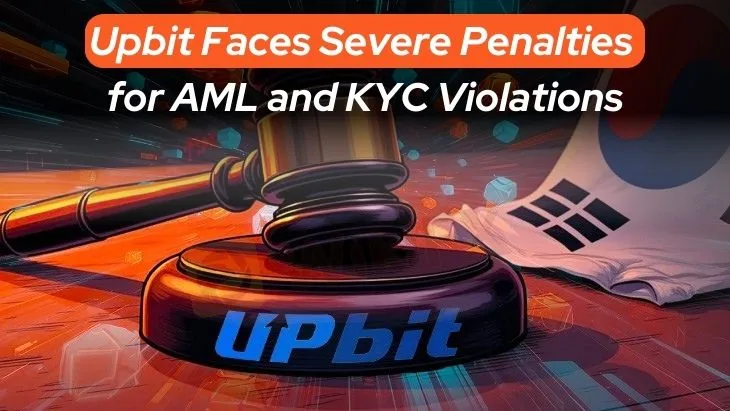简体中文
繁體中文
English
Pусский
日本語
ภาษาไทย
Tiếng Việt
Bahasa Indonesia
Español
हिन्दी
Filippiiniläinen
Français
Deutsch
Português
Türkçe
한국어
العربية
Upbit Faces Severe Penalties for AML and KYC Violations
Abstract:Upbit, South Korea’s leading cryptocurrency exchange, faces severe penalties for over 700,000 AML and KYC violations.

South Koreas largest cryptocurrency exchange, Upbit, is facing sanctions from financial regulators for failing to meet Anti-Money Laundering (AML) and Know Your Customer (KYC) obligations. According to the Financial Intelligence Unit (FIU) under the Financial Services Commission (FSC), Upbit has been found responsible for as many as 700,000 cases of improper KYC implementation and conducting transactions with unregistered overseas virtual enterprises, violating the Act on Reporting and Using Specified Financial Transaction Information.
On January 9, the FIU issued a pre-sanction notice to Upbit, proposing a core measure to suspend its new customer-related operations for up to six months. While existing users‘ transactions will not be affected, the sanction could severely limit Upbit’s ability to expand its market presence. Furthermore, the exchange may face fines of up to KRW 100 million per violation, significantly increasing its compliance costs.
South Koreas Increasing Regulation of Virtual Assets
The penalty against Upbit is not an isolated incident but part of South Koreas broader effort to bring order to the virtual asset industry. Since the enactment of the Virtual Asset User Protection Act in July 2023, authorities have intensified oversight of exchanges to combat illegal and unfair market practices, promoting transparency and security in the sector.
As the market leader, accounting for over 70% of the country‘s trading volume, Upbit’s investigation has drawn significant attention across the industry. Smaller exchanges fear similar regulatory scrutiny and are tightening internal compliance measures. Through high-profile enforcement actions like this, the South Korean government aims to signal a tougher regulatory stance and lay the groundwork for a more comprehensive cryptocurrency compliance framework.
Future Implications: Upbits Licensing and Industry Impact
This sanction raises uncertainties regarding the renewal of Upbit‘s business license. Upbit’s license expired in October 2023 and is currently under review. The sanctions outcome could directly impact the renewal process and may result in stricter compliance requirements.
Additionally, the investigation revealed that Upbit engaged in business with unregistered overseas virtual enterprises without verifying their qualifications. Although Upbit attributed these issues to difficulties in assessing counterparties credentials, the lapses highlight gaps in its internal compliance system. This has fueled concerns about stricter measures from regulators for similar cases in the future.
Conclusion
The Upbit case represents a significant test for cryptocurrency exchanges and a push toward greater standardization within the industry. As the January 21 hearing approaches, the outcome will be closely watched for its implications on Upbit‘s operations and its broader impact on South Korea’s and the global cryptocurrency markets.
Disclaimer:
The views in this article only represent the author's personal views, and do not constitute investment advice on this platform. This platform does not guarantee the accuracy, completeness and timeliness of the information in the article, and will not be liable for any loss caused by the use of or reliance on the information in the article.
Read more

CryptoCurrency Regulations in India 2025 – Key Things You Should Know
Cryptocurrency has become a major trend in today’s world. Crypto Experts believe it’s the future, which is why many people are investing heavily in it. But before jumping in, it’s important for crypto enthusiasts to understand the key rules about cryptocurrency in India.

Tokenized Stocks: Innovation or Just Another Wrapper?
While tokenized stocks promise global, round-the-clock trading, many platforms only offer synthetic exposure similar to CFDs. Without shareholder rights or deep liquidity, their added value remains in question.

Crypto Craze Fizzling Out? Here is Why
The Crypto Craze among users is fading out. The wave of Cryptocurrency has slowed down. But what are the major reasons why this has happened?

Consob Cracks Down on Abusive FX Brokers and Crypto Platforms
Consob intensifies efforts to regulate the FX broker industry by blocking six additional websites offering unlicensed trading and crypto services in Italy.
WikiFX Broker
Latest News
Tokenized Stocks: Innovation or Just Another Wrapper?
Gold Rush Again: What's Driving the Bullion Market Crazy Ahead of US Jobs Data?
XTB Launches Tax-Advantaged Retirement Accounts in Poland
Zaffex Broker Review
ECB Ends Easing Cycle, But The Eurozone Crisis Is Just Beginning
Amazon deploys its 1 millionth robot in a sign of more job automation
MT4 and MT5 Platforms - Helping Traders Up Their Forex Trading Game
A bare-bones deal is Europe's best hope in trade talks with the U.S., sources say
10-year Treasury yield remains higher despite weak ADP jobs report
Blueberry Markets Revamps its Website
Currency Calculator


